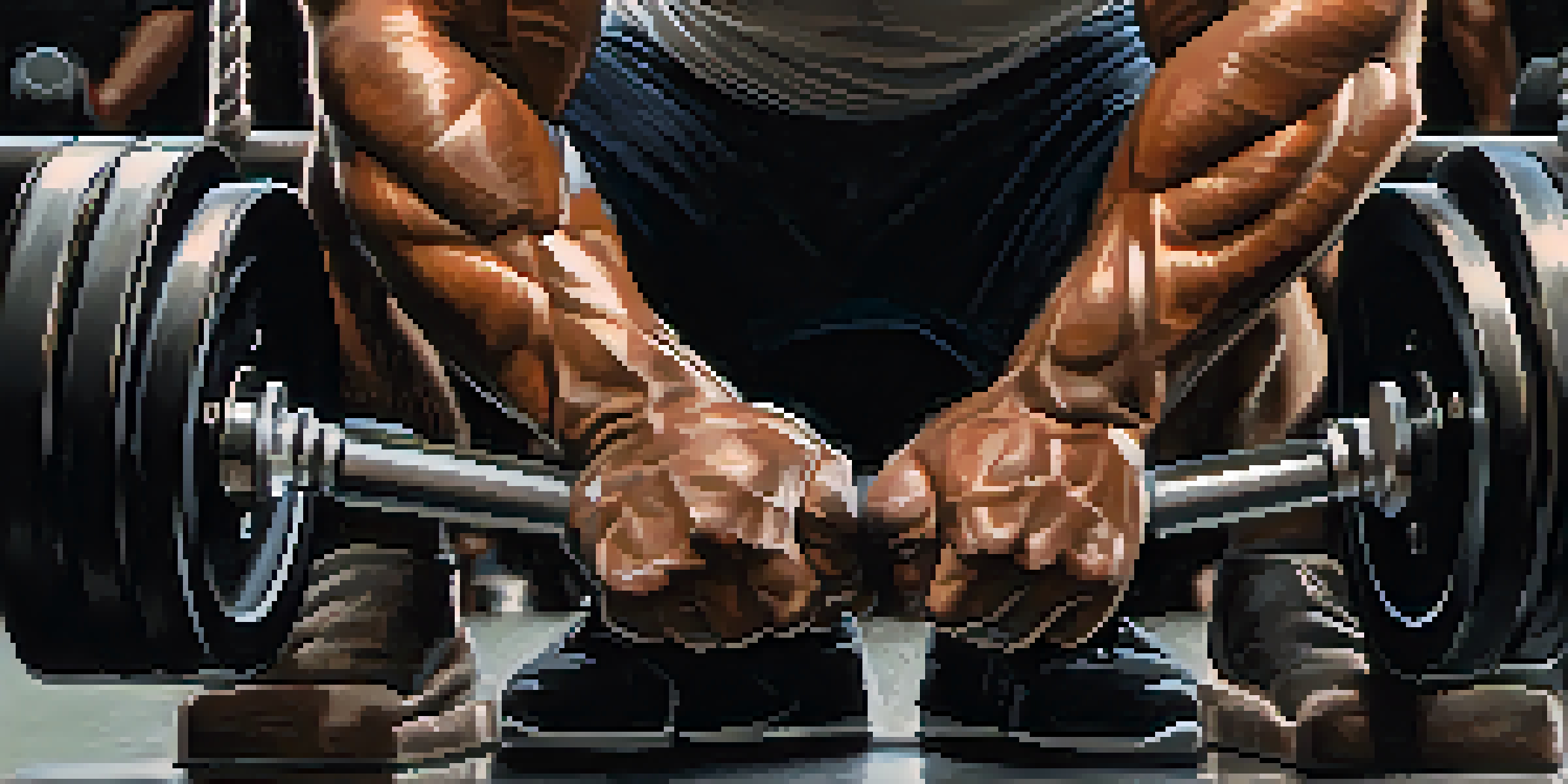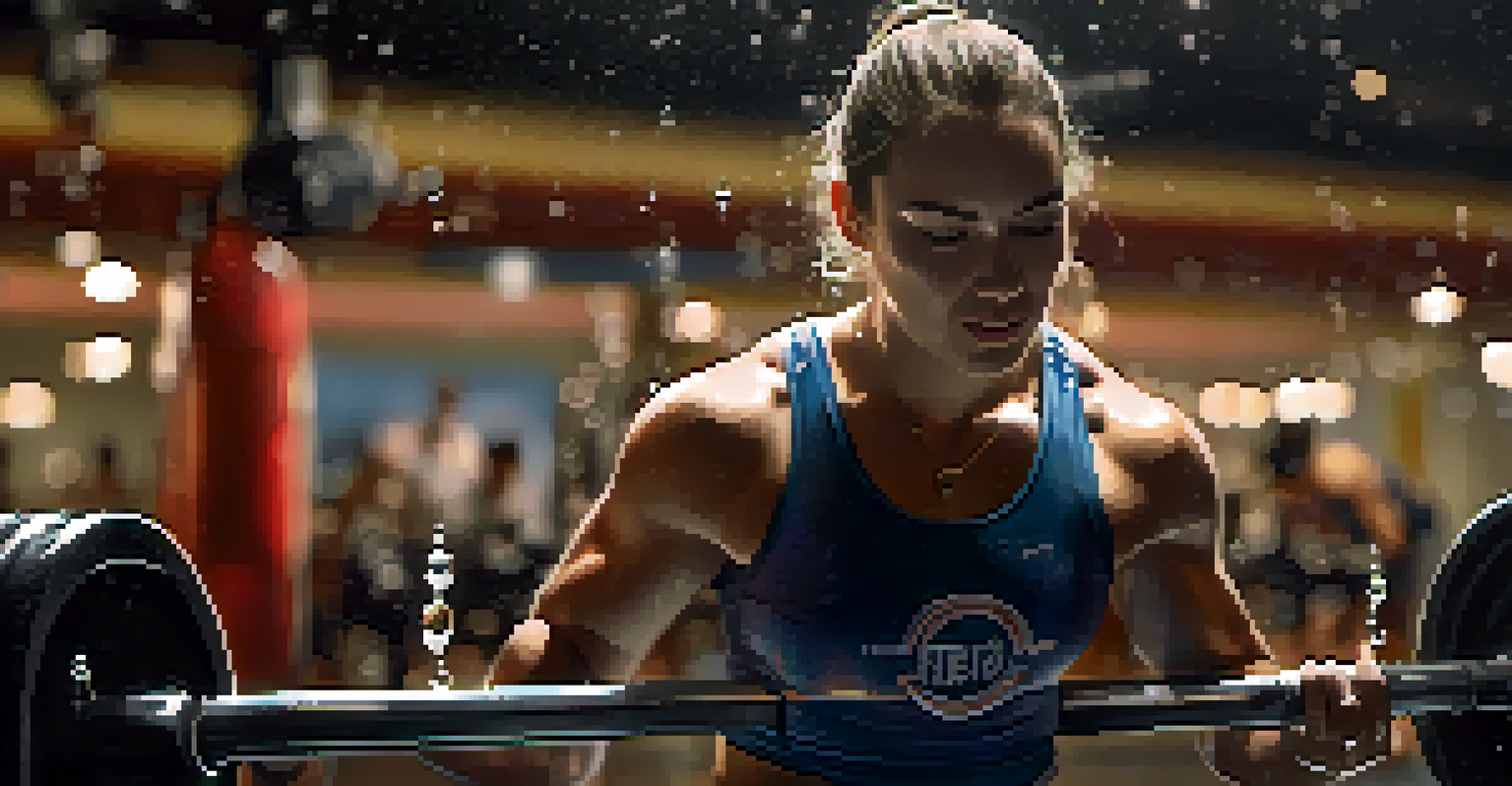Nutrition Strategies for Optimal Powerlifting Performance

Understanding the Role of Nutrition in Powerlifting
Nutrition plays a crucial role in powerlifting, influencing recovery, strength, and overall performance. When you lift heavy, your body needs the right fuel to support intense training sessions and optimize gains. This means not just any food will do; you need to focus on what nourishes your muscles and aids recovery.
You are what you eat, so don't be fast, cheap, easy, or fake.
Think of your body as a high-performance engine. Just as a car needs the right type of fuel to run efficiently, athletes require specific nutrients to maximize their powerlifting potential. Proper nutrition can mean the difference between hitting a personal record and feeling sluggish during a lift.
By understanding how different nutrients impact your body, you can create a tailored nutrition plan that supports your goals. This article will explore various strategies to ensure you’re getting the most out of your powerlifting journey.
Macronutrients: The Building Blocks of Performance
Macronutrients—proteins, fats, and carbohydrates—are essential for any powerlifter. Each plays a unique role; for instance, protein helps repair and build muscle, while carbohydrates provide the energy needed for those intense lifts. Fats, on the other hand, support hormone production and overall health.

A good rule of thumb is to consume a balanced diet that includes all three macronutrients. For powerlifters, protein should be prioritized, aiming for around 1.2 to 2.2 grams per kilogram of body weight, depending on your training intensity. Carbs should fill in the gaps, particularly around workouts to fuel and recover effectively.
Nutrition Fuels Powerlifting Success
Proper nutrition is essential for optimal performance, recovery, and strength in powerlifting.
It's important to adjust your macronutrient ratios based on your training cycle. For example, during a bulking phase, you might increase caloric intake, especially from carbohydrates, to support muscle gain and recovery.
Hydration: The Unsung Hero of Performance
Hydration is often overlooked but is vital for optimal performance in powerlifting. Water regulates body temperature, lubricates joints, and helps transport nutrients to muscles. Dehydration can lead to decreased strength and endurance, making it crucial to stay hydrated throughout the day.
Good nutrition creates health in all areas of our existence. All parts are interconnected.
A simple way to monitor hydration levels is to pay attention to your urine color. If it’s pale yellow, you’re likely well-hydrated; if it’s dark, it's time to drink more water. Also, consider your training environment; hot and humid conditions can increase your fluid needs significantly.
In addition to water, electrolyte balance is important, especially after intense sessions. Incorporating electrolyte-rich beverages can aid in recovery and keep your performance at its peak.
Meal Timing: Fueling Before and After Workouts
Meal timing can significantly impact your powerlifting performance. Eating the right foods before and after workouts can enhance your energy levels and recovery. Ideally, you should aim to consume a meal rich in carbohydrates and protein about 2-3 hours before lifting.
Post-workout nutrition is equally important. Consuming a mix of protein and carbs within 30-60 minutes after your workout helps replenish glycogen stores and kickstarts muscle recovery. This is when your body is most receptive to nutrients, so don’t skip this crucial window.
Hydration is Crucial for Lifting
Staying hydrated enhances strength and endurance, making it a key component of powerlifting performance.
Experiment with meal timing to see what works best for you. Some lifters prefer a larger meal before training, while others may opt for a small snack to avoid feeling sluggish. Find your sweet spot to maximize your lifting potential.
Supplements: Do They Really Help?
Supplements can provide a boost to your nutrition but shouldn't replace whole foods. Common supplements for powerlifters include protein powders, creatine, and branched-chain amino acids (BCAAs). These can help fill nutritional gaps and enhance performance when used correctly.
For instance, creatine has been well-researched and shown to improve strength and muscle mass when combined with resistance training. It works by increasing your muscles' phosphocreatine stores, allowing you to perform better during high-intensity lifts.
However, it's important to approach supplements cautiously. Always consult with a healthcare professional before starting any new regimen, especially if you have underlying health conditions.
Listening to Your Body: The Key to Nutritional Success
Listening to your body is perhaps the most underrated strategy in powerlifting nutrition. Everyone’s body responds differently to food, so it's crucial to pay attention to how certain meals affect your energy levels and performance. Keeping a food diary can help you identify what works best for you.
For example, some lifters thrive on higher carbohydrate diets, while others may find a moderate approach more effective. Experimenting with different foods and timings can lead to discovering your optimal nutrition strategy.
Meal Timing Boosts Recovery
Strategic meal timing around workouts can significantly improve energy levels and recovery for powerlifters.
Recognizing fatigue, hunger cues, and recovery signals can guide your eating habits. This intuitive approach can enhance your performance and overall well-being, making you a more effective lifter.
Adapting Nutrition for Competition Day
Competition day nutrition can be a game-changer for powerlifters. You’ll want to ensure you’re well-fueled and hydrated, but the strategies may differ from regular training days. It's essential to plan your meals and snacks around the timing of your lifts to optimize performance.
Many lifters prefer a familiar breakfast, rich in carbohydrates and moderate in protein, to set the tone for the day. During the event, quick snacks like bananas or energy gels can provide a fast source of glucose to keep energy levels high.

Additionally, managing anxiety and nerves through proper nutrition can make a significant difference. Avoid trying new foods or supplements on competition day, as this can lead to unexpected digestive issues. Stick to what you know works for you!